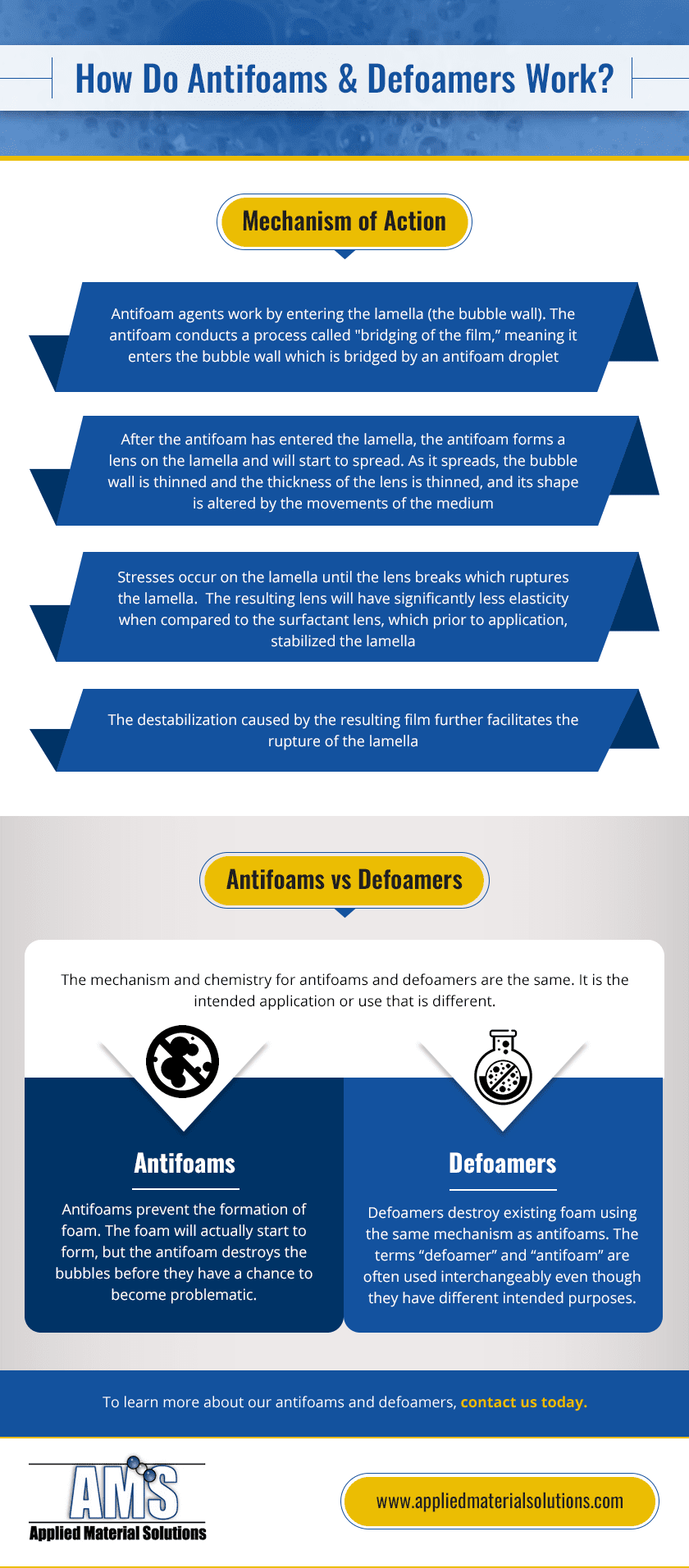The Future of Defoamers: Innovations and Trends in Foam Control Solutions
The Future of Defoamers: Innovations and Trends in Foam Control Solutions
Blog Article
The Function of Defoamers in Enhancing Item Top Quality and Performance
Defoamers serve as important additives that minimize this concern, making sure smoother production process while enhancing the visual and useful characteristics of the last products. The option of the proper defoamer can be essential to attaining optimal results, raising crucial inquiries about solution compatibility and performance metrics that merit more exploration.
Understanding Defoamers
Understanding the function of defoamers is crucial for keeping item high quality across numerous industries. Defoamers are chemical additives designed to reduce and prevent the development of foam in liquid systems, which can negatively affect processes such as blending, loading, and surface area stress. Foaming can cause inefficiencies, product issues, and endangered visual charm, making defoamers an important component in manufacturing procedures.
In commercial applications, defoamers assist to boost product uniformity and security. The effective usage of defoamers not just guarantees smoother production processes but also adds to exceptional product efficiency.
Furthermore, the selection and solution of a defoamer have to line up with specific application demands, such as compatibility with various other active ingredients, effectiveness under differing temperature and pH conditions, and potential regulatory constraints. Ultimately, comprehending defoamers' functions and their importance in different formulations is vital for optimizing manufacturing and guaranteeing the finest quality final product.
Sorts Of Defoamers
Defoamers can be classified into a number of types based on their composition and system of action. The primary kinds include silicone-based, non-silicone organic, and not natural defoamers.
Silicone-based defoamers are among the most effective, mainly due to their capability to spread rapidly on the liquid surface area and disrupt foam development. Their one-of-a-kind chemical framework permits for remarkable security, making them ideal for high-temperature applications and atmospheres with varying pH levels.
Non-silicone natural defoamers, usually made up of fatty acids or natural oils, are valued for their biodegradability and reduced poisoning. These are typically utilized in food and beverage applications where safety and ecological influence are vital.
Inorganic defoamers, that include materials like talc or calcium carbonate, act by boosting the density of the liquid, therefore lowering foam security. They are often made use of in industrial processes where compatibility with other materials is not a worry.
Each kind of defoamer has distinct advantages and limitations, allowing for tailored options relying on the certain lathering concerns come across in different applications. Comprehending these differences is crucial for maximizing efficiency and accomplishing wanted product high quality.
Applications Across Industries
Many markets leverage defoamers to improve product high quality and operational efficiency. In the food and drink sector, defoamers are important in procedures such as brewing and dairy products production to stop foam formation, which can cause inadequacies and product incongruity. By regulating foam, producers can make certain much better yield and a much more consistent product.
In the pharmaceutical market, defoamers play a crucial duty in the formulation of liquid medicines, where too much foam can restrain blending and precise application. Their use helps maintain the stability of the formulations and assists in smoother manufacturing processes.
The paint and layers market likewise relies on defoamers to improve the efficiency of products during application. By lessening foam, these ingredients ensure a smoother surface and boost the visual qualities of the end product.

Advantages of Utilizing Defoamers
While the application of defoamers varies across sectors, their benefits consistently boost product top quality and procedure performance. review One significant benefit is the reduction of foam development throughout manufacturing processes, which can or else result in production hold-ups and disparities in item high quality. By decreasing foam, defoamers allow a smoother flow of products, promoting much more efficient procedures and reducing the likelihood of equipment breakdowns.
Additionally, using defoamers can enhance the look and appearance of final products. In sectors such as finishes, paints, and food handling, excessive foam can compromise the visual looks and general high quality, while the suitable defoamer application makes sure a consistent surface and desirable qualities. Defoamers can contribute to set you back savings by reducing waste during production and enhancing the usage of raw materials.

Choosing the Right Defoamer
Choosing the ideal defoamer is important for enhancing production processes and ensuring product quality. The selection of defoamer affects not only the effectiveness of foam control but likewise the total efficiency characteristics of the final product. Aspects to consider consist of the sort of application, the chemistry of the formulation, and the ecological conditions under which the item will certainly be used.
Various industries might call for specific defoamer kinds, such as silicone-based, organic, or polymeric defoamers. Comprehending the compatibility of the defoamer with the primary active ingredients is important to avoid negative responses that might compromise item integrity. Furthermore, the defoamer's performance in various temperatures and pH levels need to be evaluated to make sure constant performance.
Testing the defoamer in small applications can offer valuable insights into its performance and suitability. Consideration of regulatory compliance, particularly in food, pharmaceuticals, and cosmetics, is critical in picking a defoamer. Eventually, a detailed assessment of these aspects will certainly lead to the selection of a defoamer that not just regulates foam effectively yet additionally boosts the top quality and performance of the last item.
Conclusion

Finally, defoamers are crucial additives that dramatically improve item quality and efficiency throughout various industries. By successfully minimizing foam development, these click to find out more agents not just improve functional efficiency however also add to the aesthetic and useful integrity of items. The tactical choice and application of defoamers bring about set you back financial savings, optimized source use, and increased client satisfaction. On the whole, the value of defoamers in industrial procedures can not be overemphasized, as they play a crucial function in accomplishing constant and top quality end results.
Frothing can lead to inadequacies, product defects, and jeopardized visual allure, making defoamers a crucial part in producing procedures.

Report this page